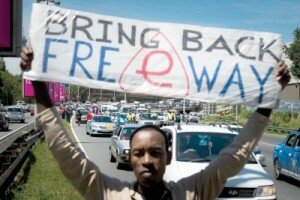Nyagaka Anyona Ouko, the Mobile Money Transfer Innovator
As told in the first part of this sweeping series -- The Curious Case of Nyagaka Anyona Ouko, the Mobile Money Transfer 'innovator' - Part I-- Ouko had already a few agents setup across Kenya who were part of his Mobile Cash Transfer business. He was already “turning a profit” as he tells HumanIPO.
Needing to open a bank account to better run the business, he headed to Kenya’s Attorney General’s office to register the business name, MOBICASH MONEY TRANSFER Ltd. This is a legal requirement in Kenya -- that before opening a business bank account, one should have registered a business name with the Attorney General’s office.
Dead End
At the AG’s office, all seemed well when a search was done and the name was found to be available for registration, but, just before he could get the registration, Ouko was informed that “they required a letter from the Ministry of Finance – Treasury clearing me to run a money related business,” as he retells his visit.
So, as instructed, he headed to the treasury office where more bad news awaited him, more like a dead end to a pursuit of his mobile money transfer business.
Ouko says of his visit to the treasury: “The lady told me that first and foremost, I was in actual sense running a briefcase bank. She asked me to tell her that I was willing to stop that business with immediate effect. Failure to which she would send in the police.
"She also told me that before I could be advised of the requirements I needed to prove that I had in my bank account (I did not own a bank account back then save for a Postbank one) KSh10 million (approx US$117,000). Actually, she even went ahead to advise me that once I had the money in my account then I will come back and be allowed to see her in her office.”
This proved to be the final blow to Ouko running his mobile money transfer business independently, he would have to re-strategise because, as he narrates his story, he did not have the amount.
Mentor and Detour
With that blow, his dream to run the business independently and many nay sayers telling him it’s not possible, Ouko garnered more strength amidst the negativity. He also sought advice from many people as he retells, but one such notable person is Mtumishi Augustino Njeru Kathangu.
Kathangu, or Mtumishi as he is popularly known, is a former member of parliament in Kenya. He is currently the Secretary General of the “Forum for the Restoration of Democracy-Asili” (FORD-Asili) among many of the organisations he is involved in.
Ouko was introduced to Kathangu by his longtime business partner, Patrick Musembi. Believing that Kathangu’s political connections, experience and knowledge could possibly assist him in setting up his mobile money transfer business.
As Ouko narrates: “Therefore one afternoon, in September 2003 armed with a note from Patrick Musembi to introduce me, I met Mtumishi. We had a long chat whereupon I explained to him what proposal I had which I wanted to deliver to specifically Safaricom.
“He asked me why I was only thinking about Safaricom, I told him because I believed that Safaricom was above board and I would be very comfortable dealing with them. He actually went ahead and gave me a short lecture about Safaricom.”
A lecture, it turns out, that Ouko has asked that we not retell. He does say though that Kathangu warned him that any idea or concept he has, he should assume it will not be safe with anyone or any company.
“He actually advised me to try and seek some form of IP protection. To be honest. He was the first person to tell me point blank that not all good those nice sounding companies will care about protecting my idea. He actually painted a picture of very hungry companies which will not hesitate to even gobble one whole if it meant adding some more profit. At the time it was very difficult to understand and believe but I got the message.” Ouko said.
Armed with that advice from his newly found mentor, Ouko wrote his first proposal and delivered it to the Kenya Industrial Property institute (KIPI) in December 2003. This trip marked the start of a detour in Ouko’s business strategy as his pursuit to run it independently failed.
Ouko continues and tells of his visit to KIPI “whereupon I briefly talked to a gentleman who explained to me that KIPI only gave protection to utility models. He flipped through my booklet and advised me that the document will be better protected by the Kenya copyright office (KECOBO).”
Missing Documents
Being the businessman he is, Ouko in 2004 started an aviation college in Dar Es Salaam, Tanzania with the assistance of investors, but before departing for Tanzania, he dropped off his proposal at the KECOBO where he was instructed to check back within a month.
“I left for Tanzania and the ensuing months I was always on the move. . I went back again in April 2005. The guys I found did not know about the document I had deposited with them so they again asked me to deposit with them yet another one,” Ouko says.
Ouko retells of another missing document: “Come November 2005 that too was missing. So I requested the services of a Lawyer Mr. James Ong’ondo. When I came back in April 2006, he already had a letter from the copyright board. So now I was happy I was protected.”
“Armed with a copy of the copyright letter, a cover letter and a copy of the proposal the lawyer deposited the documents at the offices of the then Managing Director Michael Joseph. I still have the signed delivery book up to this day,” Ouko adds.
Part III of this series on HumanIPO to hear what happens next.



















































